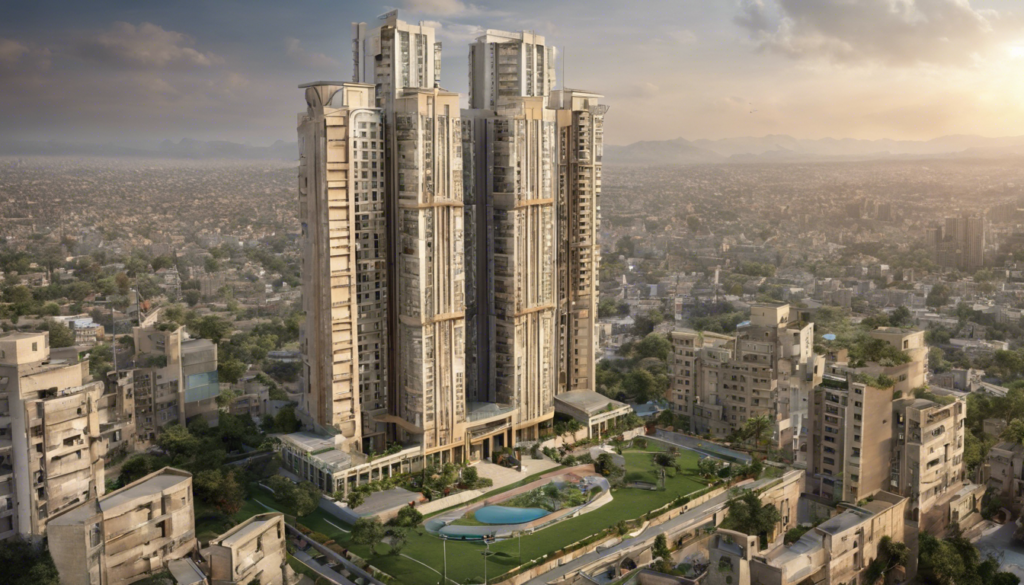Impact of Budget 2024 on Property Tax in Pakistan’s High Rise Buildings
iramshahzad
July 5, 2024

Within the evolving landscape of Pakistan’s real estate sector, the introduction of Budget 2024 brings with it a pivotal shift, notably in the realm of property tax. As an integral component of the nation’s fiscal framework, the adjustments to property tax in Pakistan under this new budget holds significant implications for owners, investors, and stakeholders within the real estate market. The essence of these changes is not just in their capacity to influence the market dynamics but in their potential to reshape the economic contours of real estate investment and ownership in Pakistan, particularly focusing on high-rise buildings that are becoming increasingly prominent in urban skylines.
This article aims to unpack the ramifications of Budget 2024 on property tax in Pakistan, with a specific lens on its differential impact on high-rise buildings. You will be guided through the newly instituted property tax regulations and explore the contentious 7-E tax clause, along with its far-reaching consequences. Furthermore, adjustments made to capital gains tax and how they weave into the broader tapestry of real estate taxation will be examined. As you delve into these segments, you’ll gain a comprehensive understanding of how these policy shifts influence the real estate landscape, enabling you to navigate the complexities of property taxes in Pakistan more effectively.
2. New Property Tax Regulations in Budget 2024
Budget 2024 introduces significant changes to the property tax landscape in Pakistan, particularly affecting how taxes are levied on the buying and selling of immovable properties. These changes are designed to differentiate between filers, non-filers, and late filers, with a clear intent to encourage compliance and enhance tax collection.
- Changes in Tax Rates
The new tax regulations introduce a revised structure for both the purchase and sale of properties.
3. Impact on Non-Filers and Late Filers
The budget specifically targets non-filers and late filers with stringent measures to compel tax compliance:
- Non-Filers
Individuals who have not registered or submitted tax returns face significantly higher taxes. For instance, non-filers purchasing properties valued up to Rs. 50 million now encounter a 12% tax rate, a substantial increase aimed at discouraging tax evasion.
- Late Filers
Those who miss filing deadlines but engage in property transactions to avoid higher tax rates will now face increased scrutiny and higher taxes. This category has been introduced to identify and penalize those who manipulate filing timelines to their advantage.
These measures reflect the government’s commitment to enhancing tax compliance and ensuring that all stakeholders contribute fairly to national development.
4. Differential Impact on High Rise Buildings
In Budget 2024, the tax treatment for high-rise buildings in Pakistan has been specifically tailored to address the unique dynamics of this sector. The Capital Gains Tax (CGT), for instance, is structured to incentivize longer-term investments in high-rise properties. Here’s a detailed look at the changes:
- Capital Gains Tax (CGT)
Irrespective of holding period capital gain tax will be applicable @ 15% on filers and up to 45% on non-filers.
| Tax Payer | Property value up to Rs 50 million | Property value from Rs 50 million to Rs 100 Million | Property value above Rs. 100 million |
|---|---|---|---|
| Filers | 3% | 3.5% | 4% |
| Late/Delayed Filers | 6% | 7% | 8% |
| Non-Filers | 12% | 16% | 20% |
| Tax Payer | Property value up to Rs 50 million | Property value from Rs 50 million to Rs 100 Million | Property value above Rs. 100 million |
|---|---|---|---|
| Filers | 3% | 4% | 5% |
| Late/Delayed Filers | 6% | 7% | 8% |
| Non-Filers | 10% | 10% | 10% |


5. Controversial 7-E Tax and Its Implications
- Background of 7-E Tax
The Section 7-E of the Income Tax Ordinance, 2001, introduced through the Finance Act, 2022, has been a focal point of controversy. It deems a certain percentage of the fair market value of capital assets as taxable income, irrespective of actual income generated. This provision was initially aimed at enhancing tax revenue from high-value assets but has faced significant legal challenges. The Islamabad High Court, in a recent judgment, declared Section 7-E unconstitutional, labeling it as confiscatory and discriminatory, thus violating Articles 23 and 25 of the Constitution of Pakistan.
- Current Legal Challenges and Repercussions
The legal landscape around Section 7-E is complex, with multiple high courts providing conflicting judgments. The Lahore High Court’s decision to suspend the operation of Section 7-E was overturned on appeal, reinstating the tax provision from February 15, 2024. This reinstatement reflects ongoing legal disputes and the government’s determination to enforce this tax measure.
The Peshawar High Court also weighed in, declaring the section beyond the legislative competence of the Parliament, highlighting a significant disconnect between national and provincial jurisdictions over tax imposition on immovable property. This ongoing legal contention underscores the challenging balance between federal revenue generation and constitutional mandates regarding taxation powers.
These judicial decisions not only impact the immediate fiscal policies but also set a precedent for how tax laws are interpreted and enforced in relation to constitutional rights and legislative boundaries in Pakistan. The controversy surrounding Section 7-E continues to evoke debate on the appropriateness of taxing deemed income and the broader implications for taxpayers and the real estate sector.
- Capital Gains Tax Amendments
Starting July 1, 2024, you will see a major overhaul in the capital gains tax (CGT) system as it pertains to real estate and securities, following the new regulations set forth in Budget 2024. This shift introduces a flat CGT rate of 15% for all filers, irrespective of the holding period, marking a significant departure from the previous tiered tax structure that favored longer holding periods.
6. Conclusion
Through the comprehensive exploration of Budget 2024’s significant overhaul of property tax regulations in Pakistan, especially concerning high-rise buildings, it is clear that these changes mark a substantial shift in the real estate landscape. The introduction of differentiated tax rates based on filer status, alongside the detailed modifications to Capital Gains Tax, is meticulously designed to foster compliance and stimulate investment in the sector. Moreover, the contentious 7-E tax clause and its legal challenges have shed light on the complex interplay between legislative actions and constitutional mandates, highlighting the dynamic nature of tax law and its implications on real estate investments. As discussed, these reforms are not merely fiscal adjustments but strategic moves aimed at reshaping Pakistan’s real estate market, making it more transparent, compliant, and dynamic.
Reflecting on the broader implications, it is evident that these policy shifts are set to have a profound impact on investors, developers, and the general market sentiment towards real estate investment in Pakistan. Such measures are expected to encourage more reasoned investment strategies, potentially reducing speculative activities and promoting longer-term holdings. However, as the landscape adjusts to these new regulations, stakeholders must remain cognizant of the ongoing legal disputes and their potential to influence future tax policies. The need for further research and active engagement with these policies is paramount to navigate the evolving terrain of real estate taxation. Thus, as Pakistan strides toward a more structured and equitable real estate market, the significance of these changes cannot be understated, necessitating continued observation and adaptation by all stakeholders involved.
